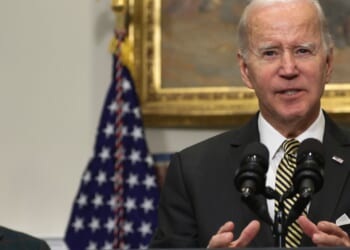James Burnham and William F. Buckley Jr. must be turning over in their graves as their successors at National Review again join the Democratic and neoconservative war party. It was only about 20 years ago that National Review’s neocons cheered on the Afghan and Iraq wars led by Rich Lowry, David Frum, Jonah Goldberg, David French, and others, only to be scolded by an aging Buckley who saw the wars’ futility. Now, National Review’s writers, including Andrew McCarthy (who blames Trump, not Zelenskyy, for the Oval Office debacle), Noah Rothman (who calls Trump Republicans a national embarrassment for supporting a negotiated ceasefire), Jim Geraghty (who claims that Trump has made the U.S. Putin’s ally in the war), and Dan McLaughlin (who supports Ukraine’s fight even in defeat), have joined the Ukraine war hawks who are apparently willing to fight Russia to the last Ukrainian. (RELATED: Vance in Munich and Foreign Policy Realism for the Modern World)
Burnham and Buckley were foreign policy realists who didn’t always get things right but who usually recognized a lost cause when they saw one. Ukraine is a lost cause, and the people suffering the most from the war are Ukrainians. Vladimir Putin is causing that suffering by continuing his war of aggression. President Donald Trump wants to end the suffering by mediating a negotiated settlement where Ukraine may have to trade land for peace, as Israel did with Egypt in the Camp David accords. (RELATED: Is US Support for Ukraine Over?)
Trump wants to improve U.S. relations with Russia so the United States can better deal with its main enemy, Communist China, which is sound geopolitics but difficult from a public relations standpoint. The mainstream media, foreign policy establishment, many European political leaders, and the U.S. war party have portrayed Putin as Hitler and characterized any negotiations with Putin as another Munich.
The U.S. war party routinely plays the “Munich card” when it wants us or our allies to wage war for abstract ideals instead of concrete interests. The war party has declared that Zelenskyy is another Churchill whom we must support now or be faced with another Munich-like disaster. And anyone who wants to negotiate with Putin is the reincarnation of Neville Chamberlain, the appeaser. We’ve been here before. The so-called “domino theory” was the Munich analogy updated for the Vietnam War. The Afghan and Iraq wars and the Global War on Terror, we were told, were collectively World War IV — the Western democracies against “Islamo-fascism” (calling radical Islamists “fascists” reinforced the Hitler and Munich analogies).
The war party appeals to emotions and sentiment: good versus evil, democracy versus autocracy. No one in the war party has yet presented a persuasive case that Ukrainian independence is in the vital interest of the United States, so they resort to the Munich analogy. If Putin succeeds in holding Crimea and some eastern provinces of Ukraine, we are told, Putin will take all of Ukraine next. Then he will take the Baltic States and Poland, and before we know it, Russian tanks will be surging toward the English Channel. (RELATED: The Evil People Surrounding Volodymyr Zelenskyy)
Those more rational members of the war party understand how ridiculous that sounds, so instead, they contend that if we allow Putin to keep Crimea and some eastern provinces of Ukraine, China will be emboldened to seize Taiwan. China, the argument goes, will view a negotiated ceasefire in Ukraine as a U.S. defeat, which demonstrates that the U.S. lacks the will to resist their planned aggression in the South China Sea. Ukraine, in this analogy, is Czechoslovakia in the late 1930s — Crimea and the eastern provinces held by Russia are the Sudetenland. President Xi Jinping replaces Putin as Hitler in this analogy. Here again, the U.S. must fight to the last Ukrainian, or else China will start World War III. (RELATED: China’s Threat to Taiwan: Intentions and Capabilities)
As a foreign policy realist, President Trump is not moved by abstractions and specious historical analogies. He pursues America’s interests first and recognizes that the world’s other major powers will likewise pursue their interests. Trump’s desire to control the Panama Canal, make Canada the 51st state, rename the Gulf of Mexico the Gulf of America, and his quest for Greenland manifest a geographical sphere of influence worldview.
He appears to agree with George Kennan and Walter Lippmann that Ukraine is in Russia’s sphere of influence. He recognizes that China poses a much greater threat to U.S. interests than Russia does and seems to want to replicate Nixon’s triangular diplomacy with both powers. That is a worthy geopolitical goal but may be beyond his reach given the policies of previous administrations that effectively pushed Russia into the arms of China. Trump sees himself as a peacemaker who is willing to make imperfect deals to avoid sliding into World War III. We should all wish him well in this endeavor. I suspect Burnham and Buckley would do so.
READ MORE from Francis P. Sempa:
Liberals Supported Deals With Communists but Not With Putin







![‘We All Owe Him (Elon) a Huge Debt of Gratitude’ [WATCH]](https://www.right2024.com/wp-content/uploads/2025/03/‘We-All-Owe-Him-Elon-a-Huge-Debt-of-Gratitude-350x250.jpg)

![Trump's Admin Guts Another ‘Rogue Government Agency with Zero Accountability’ [WATCH]](https://www.right2024.com/wp-content/uploads/2025/03/Trumps-Admin-Guts-Another-‘Rogue-Government-Agency-with-Zero-Accountability-350x250.jpg)







